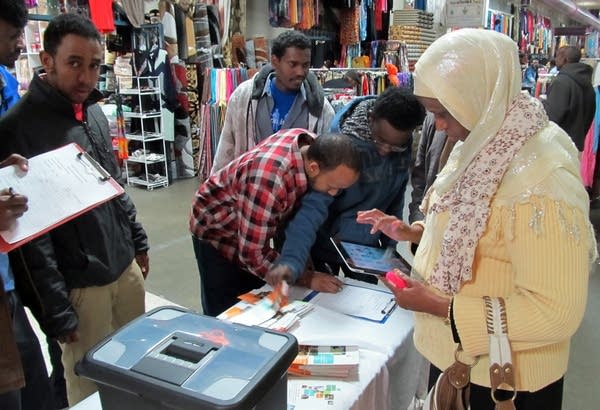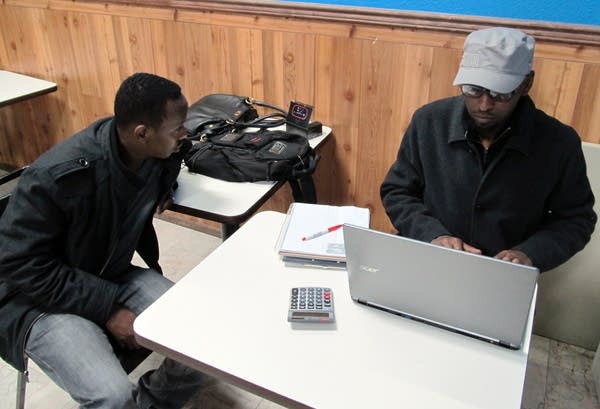Translation key to helping immigrants understand MNsure

The Somali 24 Mall and mosque in Minneapolis is a serpentine maze of stalls, where merchants selling sandals, cell phones, prayer rugs and pots try to lure the throngs of shoppers.
Most days you won't find health insurance among the wares. But that's what Asli Ashkir was trying to sell recently -- in Somali and English.
Ashkir isn't an insurance agent. She leads Somali Health Solutions, an organization designed to introduce people to MNsure, the state's new online health insurance marketplace.
Minnesota is home to at least 83,000 uninsured immigrants who may be eligible for health coverage through the state's new insurance marketplace. But convincing them to use the new exchange is proving to be a communications challenge.
Create a More Connected Minnesota
MPR News is your trusted resource for the news you need. With your support, MPR News brings accessible, courageous journalism and authentic conversation to everyone - free of paywalls and barriers. Your gift makes a difference.
Groups like Somali Health Solutions have to translate the complicated details of the health care law to immigrants who may be unfamiliar with the U.S. health system in the first place.
Ashkir's organization has crafted a decidedly Somali outreach plan that includes telephone and in-person assistance in Somali. On her visit to the mall, Ashkir enlisted the imam in the mall's mosque to talk about the program during the midday prayer.

"Whatever the Imam says is highly respected," she said. "He is the leader in the religion."
Setting up shop at the mall also was strategic. On Fridays, when few Somalis work, the shopping center attracts young, uninsured men -- a demographic that's critical to the economics of the exchange.
Hassan Abdi of Minneapolis followed the imam's advice and stopped by. Abdi, who is unemployed, dropped his health insurance earlier this year because it cost too much and covered too little. He had not heard of MNsure and wanted to know the cost.
"Sometimes, it's difficult to get the insurance that covers all of your needs," he said.
Price is a chief concern among the people she's talked to about MNsure, Ashkir said.
"But there's help available from the federal as well as the state, that's what we keep telling them," Askir said. "You will be supported if you don't make enough. The government will be at your side to help you. Then, they like that."
Still, Somali Health Solutions staffers say people struggle to understand the difference between the health care law, MNsure and insurance options.
Adding to the confusion is the fact that only people who are lawfully present in the United States can enroll.
Convincing immigrants to enroll is vital, as they have an important role in MNsure's success and holding down premiums, said state Rep. Joe Atkins, who wrote the House bill that authorized MNsure.
"We obviously want to find as many young healthy people in addition to everyone else," said Atkins, DFL-Inver Grove Heights. "But in those populations there's lots and lots of young healthy folks that help us end up with some really low rates."
Some groups, however, say MNsure has fallen short on minority outreach.
They're critical of the agency's Babe and the Blue Ox ad campaign, saying the iconic Minnesota characters are unfamiliar to non-natives.
Others lament the fact that MNsure's website is only in English.
MNsure's Spanish-language fliers aren't translated well, said Jose Barriga, who is helping enroll people in MNsure for the Open Door Health Center in Mankato.
Barriga, a native of Bolivia, points to a MNsure pamphlet about mental and behavioral health benefits, as an example.
"The word they chose for behavioral doesn't apply to a medical context," he said. "It applies to the way you act on a social scale, but it's not the technical medical term that people would associate with a condition."
MNsure officials say they used a professional translation service for the fliers.
But Barriga said the poor translations make it harder to sell MNsure to immigrants.
"You're not going to get their attention," he said. "You may just confuse them with information that's not factual and sometimes misleading."
For now, Barriga said, he will be using pamphlets he translated himself.